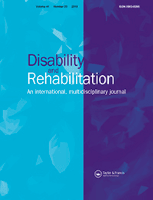
DISABILITY AND REHABILITATION
Scope & Guideline
Elevating Standards in Disability Research and Practice.
Introduction
Aims and Scopes
- Rehabilitation Science:
The journal emphasizes evidence-based rehabilitation science, exploring various therapeutic interventions aimed at improving functional outcomes for individuals with disabilities. - Multidisciplinary Approaches:
Research published in the journal often involves collaboration across multiple disciplines, including physiotherapy, occupational therapy, psychology, and social work, to address complex rehabilitation needs. - Patient-Centered Care:
A significant focus is placed on patient perspectives and experiences, emphasizing the importance of tailoring rehabilitation strategies to meet individual needs and preferences. - Innovative Technologies:
The journal covers advancements in rehabilitation technologies, including telehealth, virtual reality, and other digital interventions, showcasing their effectiveness in enhancing rehabilitation outcomes. - Community Reintegration:
Research addressing the social aspects of rehabilitation, including participation in community life and the impact of environmental factors on disability, is a core area of focus. - Health Equity and Access:
The journal highlights issues related to health disparities and access to rehabilitation services, particularly for underserved populations, advocating for inclusive practices.
Trending and Emerging
- Telehealth and Digital Interventions:
There has been a significant increase in research exploring the effectiveness of telehealth and digital interventions, especially in the context of the COVID-19 pandemic, highlighting their role in enhancing access to rehabilitation services. - Mental Health Integration:
Emerging studies increasingly emphasize the integration of mental health support within rehabilitation frameworks, acknowledging the interplay between psychological well-being and physical recovery. - Community-Based Rehabilitation:
Research focusing on community-based rehabilitation strategies is gaining traction, reflecting a shift towards enhancing social participation and community integration for individuals with disabilities. - Personalized Rehabilitation Approaches:
There is a growing emphasis on personalized rehabilitation strategies that tailor interventions to individual needs, preferences, and circumstances, moving away from standardized programs. - Resilience and Coping Mechanisms:
Emerging themes include the exploration of resilience and coping strategies among individuals with disabilities, recognizing their impact on recovery and quality of life. - Inclusive Practices and Disability Justice:
Research addressing disability justice and the importance of inclusive practices in rehabilitation settings is on the rise, reflecting broader societal movements towards equity and accessibility.
Declining or Waning
- Traditional Rehabilitation Models:
There is a noticeable decline in research centered on traditional, one-size-fits-all rehabilitation models as the field increasingly embraces personalized and patient-centered approaches. - Pharmacological Interventions:
Studies focusing primarily on pharmacological treatments for disability-related issues are becoming less common, as there is a growing preference for non-pharmacological interventions and holistic approaches. - Static Outcome Measures:
Research utilizing static or singular outcome measures for assessing rehabilitation effectiveness is waning, with a shift towards more dynamic and multifaceted assessments that consider broader aspects of patient well-being. - Focus on Physical Disabilities Only:
There appears to be a decreasing emphasis on solely physical disabilities, as the journal expands its scope to include mental health and psychosocial factors influencing rehabilitation outcomes. - General Population Studies:
Research targeting broad population samples without a specific focus on disability or rehabilitation nuances is less prominent, indicating a trend towards more targeted and condition-specific studies.
Similar Journals
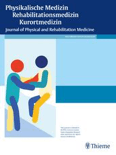
PHYSIKALISCHE MEDIZIN REHABILITATIONSMEDIZIN KURORTMEDIZIN
Connecting Professionals: A Hub for Rehabilitation AdvancementsPHYSIKALISCHE MEDIZIN REHABILITATIONSMEDIZIN KURORTMEDIZIN, published by GEORG THIEME VERLAG KG, is a prominent journal dedicated to the fields of physical medicine, rehabilitation, and resort medicine. With its ISSN of 0940-6689 and E-ISSN 1439-085X, this journal has been at the forefront of disseminating essential research and innovative practices since its inception. Operating from Germany, it offers a crucial platform for professionals, researchers, and students engaged in exploring the latest advancements in rehabilitation methodologies and therapeutic practices. Although it currently holds a Q4 ranking in several categories including Physical Therapy and Rehabilitation, the journal is committed to enhancing its impact and visibility within the academic community. The journal publishes research, reviews, and clinical studies aimed at improving patient outcomes and advancing the science of rehabilitation. Subscribers can expect high-quality content that addresses both theoretical and practical aspects of rehabilitation medicine, ultimately contributing significantly to ongoing discussions and developments in the field.

Journal of Pediatric Rehabilitation Medicine
Fostering Collaboration for Enhanced Pediatric Health OutcomesJournal of Pediatric Rehabilitation Medicine is a leading academic platform published by IOS PRESS, dedicated to advancing knowledge in the fields of pediatrics, rehabilitation, and physical therapy. With an ISSN of 1874-5393 and an E-ISSN of 1875-8894, this journal has carved a niche within the biomedical community, focusing on therapeutic innovations and evidence-based practices in pediatric rehabilitation. Recognized for its scholarly contributions, it holds a prestigious Q3 ranking in Pediatrics and Q2 rankings in both Physical Therapy and Rehabilitation categories, indicating its impact and relevance in the respective fields. Operating out of the Netherlands, the journal provides a comprehensive open access model that ensures that research is easily accessible to professionals, students, and researchers alike. With converged years spanning from 2007 to 2024, the journal continues to be an essential resource for those dedicated to enhancing the quality of life for children with disabilities and rehabilitation needs, fostering collaboration between clinicians and researchers through high-quality research dissemination.

Journal of Cardiopulmonary Rehabilitation and Prevention
Driving excellence in cardiology and pulmonary medicine.The Journal of Cardiopulmonary Rehabilitation and Prevention, published by Lippincott Williams & Wilkins, serves as a pivotal platform for the dissemination of cutting-edge research in the fields of cardiology, pulmonary medicine, and rehabilitation. With its ISSN 1932-7501 and E-ISSN 1932-751X, this esteemed journal is based in the United States and is recognized for its exceptional impact—ranking in the Q1 quartile for its categories in the 2023 metrics. The journal provides a unique blend of peer-reviewed articles that encompass innovative approaches to rehabilitation and prevention strategies, addressing the critical intersections of cardiovascular and pulmonary health. Accessibility to high-quality research is essential for healthcare professionals and researchers alike, and although the journal embraces a traditional subscription model, its rich content remains pivotal for enhancing clinical practices and advancing academic inquiry. By focusing on evidence-based practices and new therapeutics, the Journal of Cardiopulmonary Rehabilitation and Prevention continues to foster advancements in patient care and outcomes, positioning itself as an indispensable resource for those dedicated to improving cardiopulmonary health.
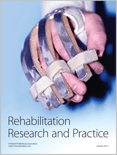
Rehabilitation Research and Practice
Empowering Recovery with Evidence-Based Practices.Rehabilitation Research and Practice is a distinguished open-access journal published by HINDAWI LTD, dedicated to advancing knowledge in the fields of rehabilitation, physical therapy, and sports therapy. With its ISSN 2090-2867 and E-ISSN 2090-2875, the journal has been a pivotal resource for researchers and practitioners since its inception in 2010. Based in Egypt and reaching an international audience, the journal encapsulates cutting-edge research and evidence-based practices that significantly contribute to patient care and rehabilitation strategies. Notably, it holds a reputable position in the Scopus rankings—42nd out of 161 in Medicine Rehabilitation and 74th out of 247 in Health Professions. The journal enjoys a Q2 status in the 2023 category quartiles, reflecting its influence and quality within the academic community. The journal's commitment to an open-access format not only enhances its visibility and accessibility but also fosters collaboration among professionals, making it an indispensable resource for anyone engaged in rehabilitation research and practice.
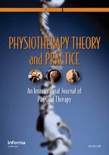
PHYSIOTHERAPY THEORY AND PRACTICE
Transforming Physiotherapy Through Interdisciplinary CollaborationPHYSIOTHERAPY THEORY AND PRACTICE is a leading journal within the realm of physical therapy, sports therapy, and rehabilitation, published by Taylor & Francis Inc. With an ISSN of 0959-3985 and an E-ISSN of 1532-5040, this esteemed journal focuses on the interdisciplinary approaches and clinical practices that advance the science and application of physiotherapy. Ranking in the top 33% of its category as indicated by its Q2 status in the 2023 category quartiles, it serves as an essential conduit for innovative research and evidence-based practices. The journal has been a vital resource since its inception in 1985, continuing to attract contributions that explore the latest developments in rehabilitation and therapy strategies. Although currently not an Open Access journal, PHYSIOTHERAPY THEORY AND PRACTICE remains pivotal in shaping the landscape of health professions, providing insightful articles that empower researchers, practitioners, and students to enhance patient care and treatment strategies in an evolving field.

Archives of Rehabilitation
Exploring New Frontiers in Rehabilitation ScienceArchives of Rehabilitation is a pioneering journal in the field of rehabilitation science, published by NEGAH SCIENTIFIC PUBLISHER. This peer-reviewed publication is dedicated to the dissemination of high-quality research, innovative practices, and comprehensive reviews that contribute to the advancement of rehabilitation methodologies worldwide. The journal seeks to engage researchers, healthcare professionals, and academic scholars by showcasing critical studies, case reports, and theoretical work that address challenges and developments in rehabilitation. Although currently not listed as open access, the journal ensures broad visibility and accessibility for stored research. With its ISSN and E-ISSN both at 2538-6247, Archives of Rehabilitation aims to be an essential hub for knowledge exchange aiming to improve patient outcomes and enhance the practice of rehabilitation.
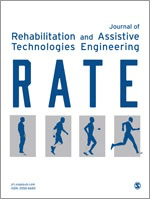
Journal of Rehabilitation and Assistive Technologies Engineering
Connecting Ideas to Improve Lives: A Hub for Assistive Tech ResearchJournal of Rehabilitation and Assistive Technologies Engineering, published by SAGE PUBLICATIONS INC, is a leading interdisciplinary journal dedicated to advancing the field of rehabilitation and assistive technologies. With an emphasis on innovative research and practical applications, this journal seeks to bridge the gap between theoretical advancements and real-world implementations, making it essential reading for researchers, healthcare professionals, and students alike. The Journal of Rehabilitation and Assistive Technologies Engineering aims to disseminate high-quality findings that enhance the quality of life for individuals with disabilities through improved technologies and rehabilitation techniques. Although it is not an open access journal, it maintains a robust impact factor reflecting its significance in the field. By focusing on collaboration between various disciplines, the journal encourages fresh perspectives and solutions that can lead to breakthroughs in assistive technology. For those looking to stay informed about the latest research and developments, this journal is a vital resource.
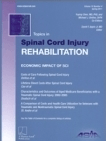
Topics in Spinal Cord Injury Rehabilitation
Elevating Standards in Spinal Cord Injury CareTopics in Spinal Cord Injury Rehabilitation is a premier journal dedicated to advancing research and clinical practices in the field of spinal cord injury rehabilitation. Published by the American Spinal Injury Association, this journal focuses on providing up-to-date insights and innovative strategies to enhance recovery and quality of life for individuals with spinal cord injuries. With an impressive trajectory from 1998 to 2024, it is recognized within the Q2 category for Neurology (clinical), Physical Therapy, Sports Therapy and Rehabilitation, and Rehabilitation as of 2023. Although the journal is not open access, it remains a critical resource for healthcare professionals and researchers, boasting a solid impact in the Scopus rankings that positions it among the top quartiles in its categories. Researchers, clinicians, and students alike will find invaluable knowledge within its pages, supporting the ongoing evolution of therapeutic approaches and rehabilitation methodologies. For subscriptions and more details, contact AMER SPINAL INJURY ASSOC at 9702 Gayton Rd, Suite 306, Richmond, VA 23238, United States.

Physiotherapy Practice and Research
Connecting research and practice for better health outcomes.Physiotherapy Practice and Research is a pivotal journal published by IOS PRESS that focuses on the dynamic field of rehabilitation and physiotherapy. Since its inception in 2009, this journal has provided a scholarly platform for researchers, clinicians, and students to disseminate innovative findings and practical applications in occupational therapy, sports medicine, and rehabilitation sciences. Although the journal currently holds Q3 and Q4 rankings in several categories, including occupational therapy and physical therapy, its impact in fostering research collaboration and informing practice is becoming increasingly important in advancing patient care and rehabilitation outcomes. With an ongoing commitment to open-access principles, the journal welcomes original research and review articles that address contemporary challenges and emerging practices within the field. As the journal continues to evolve, it aims to engage more deeply with the global research community, unlocking vital discussions that shape the future of physiotherapy.
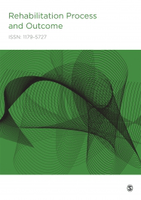
Rehabilitation Process and Outcome
Fostering dialogue for improved health outcomes.Rehabilitation Process and Outcome, published by SAGE Publications Ltd, is a premier peer-reviewed journal dedicated to advancing the field of rehabilitation science. With an ISSN of 1179-5727 and an E-ISSN of 1179-5727, this open-access journal has been committed to disseminating high-quality research since its inception in 2008. The journal provides a vital platform for researchers, clinicians, and practitioners to share innovative studies, clinical practices, and advancements in rehabilitation methodologies. Its emphasis on open access ensures that findings are readily available to a global audience, promoting collaboration and knowledge exchange in the rehabilitation community. Rainier emphasis on practical outcomes supports the journal's mission to enhance patient care and recovery processes. Based in London, England, Rehabilitation Process and Outcome continues to foster significant discourse in the rehabilitation sector, making it an essential resource for those involved in enhancing recovery strategies and overall health outcomes.